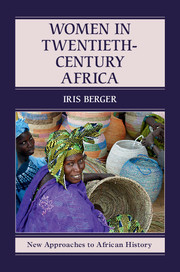Book contents
- Frontmatter
- Dedication
- Contents
- LIST OF ILLUSTRATIONS
- LIST OF MAPS
- PREFACE
- Map
- Introduction
- 1 Colonizing African families
- 2 Confrontation and adaptation
- 3 Domesticity and modernization
- 4 Mothers of nationalism
- 5 The struggle continues
- 6 “Messengers of a new design”: marriage, family, and sexuality
- 7 Women's rights: the second decolonization?
- 8 Empowerment and inequality in a new global age
- Contradictions and challenges
- REFERENCES AND FURTHER READING
- INDEX
6 - “Messengers of a new design”: marriage, family, and sexuality
Published online by Cambridge University Press: 05 May 2016
- Frontmatter
- Dedication
- Contents
- LIST OF ILLUSTRATIONS
- LIST OF MAPS
- PREFACE
- Map
- Introduction
- 1 Colonizing African families
- 2 Confrontation and adaptation
- 3 Domesticity and modernization
- 4 Mothers of nationalism
- 5 The struggle continues
- 6 “Messengers of a new design”: marriage, family, and sexuality
- 7 Women's rights: the second decolonization?
- 8 Empowerment and inequality in a new global age
- Contradictions and challenges
- REFERENCES AND FURTHER READING
- INDEX
Summary
In her first novel, So Long a Letter, Senegalese writer Mariama Bȃ describes the dilemmas that confronted educated women in the decades following her country's independence. Written as a series of letters from recently widowed Ramatoulaye to her longtime friend Aissatou, the book contrasts the choices each of them made in her effort to reconcile local cultural and religious practices with those of her French-influenced formal education.
These exceptional girls were products of an elite school that drew competitively from all of former French West Africa. Their education was designed to lift them “out of the bog of tradition, superstition and custom” and to make them “appreciate a multitude of civilizations” without renouncing their own. Referring back to their idealistic youth, Ramatoulaye recalls: “It was the privilege of our generation to be the link between two periods in our history, one of domination, the other of independence. We remained young and efficient, for we were the messengers of a new design.” “We all agreed,” she writes, “that much dismantling was needed to introduce modernity within our traditions. Torn between the past and the present … We were full of nostalgia but were resolutely progressive.”
Despite their common idealism, the two women made contrasting decisions when confronted with the painful choices that reflected their country's complex blend of old and new realities. Aissatou married a doctor, whose mother, of royal origin, disapproved of his marriage to a goldsmith's daughter. While Aissatou took a job as a teacher and enjoyed life with her husband Mawdo, attending parties and picnics, and walking on the beach, her mother-in-law plotted revenge by taking Nabou, a young girl, under her wing, having her educated as a midwife, and preparing her to become a docile second wife to her son. To save his mother from shame, Mawdo agreed to the marriage, but assured Aissatou that he loved her and would see his new wife only every other night. Unconvinced by a combination of threats and promises and refusing to accept her demotion to co-wife, Aissatou left to forge a new life. In a letter to Mawdo, she explained, “I am stripping myself of your love, your name. Clothed in my dignity, the only worthy garment, I go my way.”
- Type
- Chapter
- Information
- Women in Twentieth-Century Africa , pp. 121 - 150Publisher: Cambridge University PressPrint publication year: 2016



